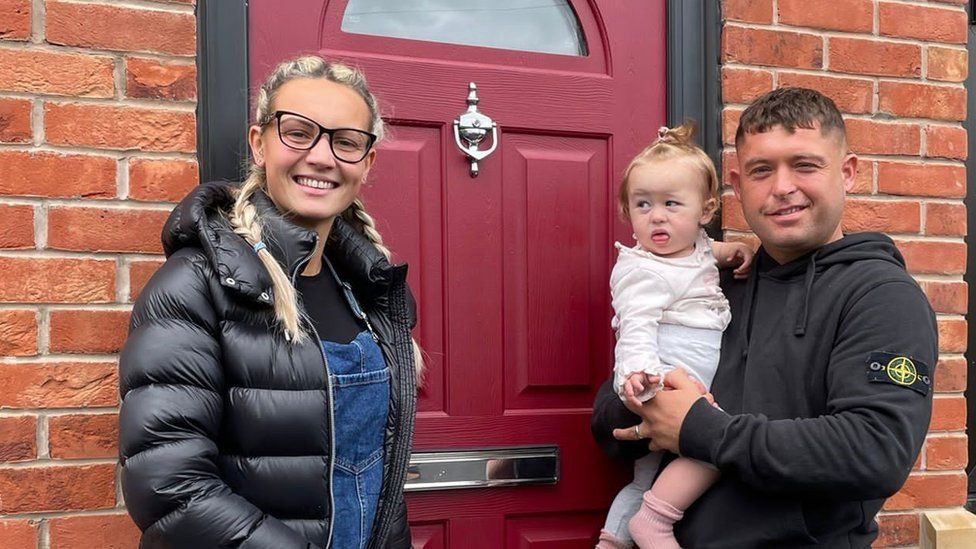ARTICLE AD BOX

Demi and Andrew say they have made lots of inquiries
By Kevin Peachey
Cost of living correspondent
Competition among renters is so intense that there are 20 requests to view each available property, according to data commissioned by the BBC.
The average number of requests to see each home has more than tripled from six in 2019, the figures from property portal Rightmove show.
The queue to view is even longer in some regions, reaching 30 in the North West of England.
One family in the area said finding a home was stressful and hard.
Demi and Andrew, who are both self-employed and have five children, said they faced "ridiculous prices", a lack of options, and a wall of silence from some agents before finding somewhere suitable near Preston.
"You can have all the money in the world, but it would still be a long process," said Demi as she looked around a home in which 50 people had shown an interest. "You go around in circles. It is so frustrating."
Demand from prospective renters has soared as rising mortgage rates are making home ownership a more distant prospect and prompting some landlords to sell up.
Following reports of lots of tenants chasing a smaller number of properties to rent, BBC News commissioned Rightmove to trawl its data and gather a picture of the growing level of competition in the private rental sector.
It found that in Britain, in May, there were typically 20 requests to view each available property in Britain from prospective tenants, up from 19 the previous year, and six in 2019, before the Covid pandemic.
In every region, the number has tripled at the least since 2019.
Anecdotal evidence shows tenants are offering more than the asking rent, or arriving early to get to the front of the queue.
Paul Forbes, an estate agent in Preston, said that properties were often let after the first block viewing of interested home-hunters because demand is so high. Choosing the successful applicant was "not a nice part of the job", he said.
Previous research by the BBC recently revealed how rental applicants with children and pets have found it even harder to secure a place.
In May, the government confirmed it planned to ban no-fault evictions in England, promising a "fairer deal for renters". But a group of charities and campaigners said there has been slow progress since. They have written to Prime Minister Rishi Sunak urging him to speed up and strengthen reforms in the private rental sector.
The government says the reforms will help create a sector "fit for the 21st Century" and the next stage of the bill will come in due course.
How can you get to the front of the renting queue
Agents say there are some simple ways to make it easier to secure a rental property, including:
- Start searching well before a tenancy ends and sign up with multiple agents
- Have payslips, a job reference, and a reference from a previous landlord to hand
- Build up a relationship with agents in the area, but be prepared to widen your search
- Be sure of your budget and calculate how much you can offer upfront
- Be aware that some agents offer sneak peeks of properties on social media before listing them
The mismatch between demand from tenants and supply from landlords has contributed to sharp increases in rents. Landlords have also been hit with rising costs, from repairs to significant increases in mortgage rates.
In the majority of the UK, affordability of renting has been at its worst for a decade. Official figures show rent rising at its fastest annual rate since comparable records began in 2016.
The average rent paid in England is £960, according to the Office for National Statistics (ONS). We asked Rightmove to work out what kind of properties could be secured for that level of rent around the country.
In some areas - particularly in London - there was nothing at that price. Much bigger properties were listed in other parts of the country, although affordability would be affected by people's incomes.
Aneisha Beveridge, head of research at Hamptons estate agents - based in South East England, said that rents in London were rising the fastest because of demand as workers and students returned after Covid.
Aneisha Beveridge says London rents will continue to rise
She said landlords in the area were selling up, because profits had dropped - with 43% fewer homes available to rent in London compared with 2019.
"That imbalance is what is fuelling rents at the moment," she said.
Rent increases were likely to continue, she said, while the profile of tenants could also start to shift. Younger people could live with parents for longer, and more than one million over 65s would be renting within a decade.
Claudia had to offer over the asking rent
That will create even more competition for renters like Claudia, who is 25 and works in sales for a research company. She and her boyfriend Michael, an engineer, have just offered £2,150 a month - some £200 more than the asking rent - for a one-bedroom London flat after a bidding war.
The cost will take up half of their combined income, but she said they had little choice.
"It was quite a stressful experience," she said.
"The [bidding war] put a bit of a downer on moving in with your partner for the first time. We were super-excited, but a few days later felt a bit deflated because you are having to pay more money - but that's just the name of the game in London right now."

 1 year ago
74
1 year ago
74








 English (US) ·
English (US) ·